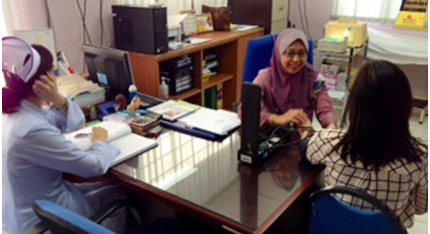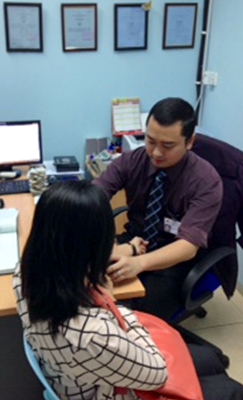From the President: Nurturing Tomorrow's Family Doctors: in Malaysia and around the world
español
Malaysia, like many other nations, has a strong focus on strengthening primary health care through a family practice model in order to ensure that health care is available to all people. Family doctors are recognized as specialists in Malaysia and postgraduate training is provided through the Academy of Family Physicians of Malaysia and local universities.

I was recently in the Malaysian city of Kuching in Sarawak, on the mystical island of Borneo, and met family doctor Maila Mustapha. Dr Maila invited me to visit her family medicine team at the Klinik Kesihatan Jalan Masjid. Dr Maila and her colleagues provide comprehensive primary care to over 1000 patients each day at their busy clinic in central Kuching.
Photo: Dr Maila Mustapha consulting at the Klinik
Kesihatan Jalan Masjid, supported by practice nurse Jennifer, in
Kuching, Sarawak, Malaysia
Like Dr Maila, as family doctors we all work hard, and many of us work under difficult conditions. Sometimes the resources that we need to do our job are not available. Sometimes the hours we work and the demands on our time can be arduous. Our resilience can be tested regularly, and there are times when we may feel unappreciated. This is why WONCA has established World Family Doctor Day, held on May 19 each year, to acknowledge and celebrate the important work carried out by every family doctor in every country of the world, and to thank you for the great work you do.
It has been wonderful over the past month to see the World Family Doctor Day activities underway all around the world, celebrating the contributions family doctors make to the lives of our individual patients and their families and to the health and wellbeing of our communities.

The Malaysian Government has recently established a network of 1 Malaysia community clinics designed to provide basic medical services for people with common health problems such as fever, injuries and respiratory infections, and management of chronic health problems like diabetes and hypertension. Based in local communities, and originally run by nurses and medical assistants, many of these clinics are now being led by family doctors, as the government recognizes the greater value of family medicine teams led by a family doctor. The 1 Malaysia clinics also act as referral points into more comprehensive primary care clinics, like the one led by Dr Maila.
Photo: Trainee doctor, Dr Haizul Amri Dzulkafli , consulting at the 1
Malaysia Clinic in Malihah in Kuching, Sarawak, Malaysia (with thanks
to Dr Lenny who posed as a patient in these photos)
As well as meeting the primary care needs of her local community, Dr Maila’s clinic in Kuching is involved in training the next generation of family doctors by offering placements to medical students and supervision of junior doctors who are training to become specialists in family medicine.
WONCA is made up of seven regions covering all the nations of the world. There have been strong movements for young and future family doctors for several years in our regions in Europe, South America, South Asia and the Asia Pacific. The past year has seen new movements launched by keen young family doctors in our Africa and Middle East regions, and on May 19 we saw the launch of our newest movement, the Polaris Movement, in North America and the Caribbean. There are now WONCA young family doctor movements in all seven regions of the world, and I encourage all young family doctors to join the activities of the movement in their part of the world. Needless to say there is a strong social media presence established by each movement to enable rapid communication and sharing of ideas and knowledge.
On World Family Doctor Day this year I was in Geneva leading WONCA’s small delegation to the World Health Assembly of the World Health Organization (WHO). The World Health Assembly is an annual meeting of the world’s health ministers who come together to set the agenda for the WHO for the coming year. This is an opportunity for WONCA to ensure that the voice of family medicine is being heard in global health policy development and in the roll out of global health programs in each region of the world. And with World Family Doctor Day occurring during the meeting, it was a great opportunity to promote the role of family doctors to our political leaders.
WONCA joined with colleagues from other global medical organisations in supporting resolutions at the World Health Assembly on strengthening the role of health systems in addressing violence, in particular violence against women and girls, and children, and in a call to ensure that palliative care and essential pain medications are available in every community. These are two areas where we have important roles as family doctors, and WONCA working party members were instrumental in crafting the statements to the Assembly, that are available on our website.
Palliative care statement
Family Violence statement
Following the World Health Assembly I travelled to Kuching to join our colleagues at the 2014 WONCA Asia Pacific Regional Conference. This successful regional conference was hosted by the Academy of Family Physicians of Malaysia, and was organised by Dr Mohammad Husni Jamal and his talented team.
At the conference I delivered the Wes Fabb Oration, paying tribute to WONCA’s first CEO, Dr Wesley Fabb, and his remarkable contribution over many years to the development and strengthening of family medicine around the world. The theme of the conference was Nurturing Tomorrow's Family Doctors and this was a very fitting title for an oration honoring Wes, who devoted his career to nurturing tomorrow’s family doctors and whose enduring legacy continues today. You can
read the oration online.
Michael Kidd
President
World Organization of Family Doctors (WONCA)